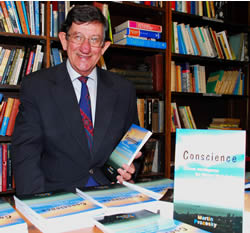
The Rhodes Research Office and the Ethical Standards Committee hosted an Ethics in Research Symposium that investigated the types of ethical issues facing researchers and provided guidance on how to ensure future research is done in an ethical manner.
The Symposium that took place on Saturday (17 April) was aimed at senior researchers including Master's students, Doctoral candidates and postgraduate students.
Professor Emeritus Martin Prozesky, a highly experienced and qualified independent applied ethics consultant, trainer and writer, delivered a thought-provoking keynote address. He started his address by looking at research projects gone wrong and the devastating results such projects had on animal and human life.
He asked the question, “whose ethics?” and followed on by discussing applied ethics for multicultural contexts.
Prof Prozesky gave a broad overview of what research is, how it’s defined, what ‘research ethics’ entails, and gave insight into what a Research Ethics Committee should be doing.
He concluded his address by discussing enhancement measures that Rhodes research teams could consider starting with ethics education for researchers and ending off by saying that ethics in research perhaps requires a renewed emphasis on “more commitment and less compliance”.
The Symposium attendees participated in in-depth discussions about research experiences at Rhodes, what ethical research ethics was, what is meant by ‘informed consent’, the ethics of research supervision and intellectual property, and who owned the research results.
The stimulating debate that followed opened minds and made participants see research ethics in ways that had not been discussed before at Rhodes. The issues that were raised were discussed at length with many agreeing that a more standardised approach needed to be developed.
The symposium also demonstrated support for the University’s Ethical Standards Committee and its sub-committees led by the Research Office and the DVC: Research and Development. Many of the suggestions and recommendations at the Symposium will in the end be incorporated into the University’s research ethics policies.
Prof Prozesky, formerly the Dean of Humanities for the University of Natal/KwaZulu-Natal and Director: Unilever Ethics Centre, was educated at Rhodes and Oxford Universities and has a doctorate from the former University of Rhodesia.
